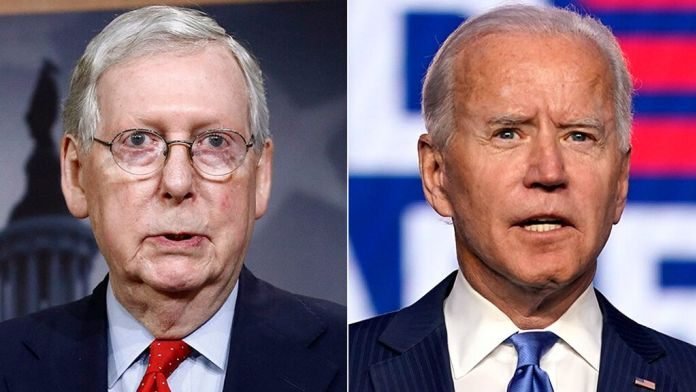Biden Response to McConnell Could Have Been Stronger
Senate Minority Leader Mitch McConnell and President Joe Biden
Effectively thinking on one’s feet and communicating successfully is not an easy skill to master and do consistently well. Regardless of the communication reaction or response, it creates impressions in the minds of an audience and elicits judgments as to quality of communication and character of the person or organization.
This past week, there was a curious, interesting political exchange between Senate Minority Leader Mitch McConnell and President Joe Biden that seemed worthy of inspection and conversation. McConnell, annoyed and upset at Biden for the president’s comments about changing the filibuster to help facilitate voting rights bills, spoke in disappointment and upset about what he had heard. Biden’s response to McConnell is the subject of this article.
First, let’s briefly look at what McConnell said about the president’s speech.
“How profoundly -- profoundly -- un-presidential," McConnell said. "I've known, liked and personally respected Joe Biden for many years. I did not recognize the man at the podium yesterday."
McConnell was furious, communicating the following:
“A president shouting that 52 senators and millions of Americans are racist unless he gets whatever he wants is proving exactly why the framers built the Senate to check his power."
McConnell called Biden’s speech “deliberately divisive” and “designed to pull our country further apart.”
“We have a sitting president -- a sitting president -- invoking the Civil War, shouting about totalitarianism and labeling millions of Americans his domestic enemies. Yesterday, he poured a giant can of gasoline on the fire."
Covering the story, ABC NEWS reporter Trish Turner asked, “Mr. President, any response to Mitch McConnell who said your speech yesterday was 'profoundly un-presidential?”
Reportedly, Biden paused, turned, removed his black mask and answered, "I like Mitch McConnell. He’s a friend."
John Capo, assistant professor of communication at Lycoming College
A puzzling reply, to be sure. No angry response? No dismantling of McConnell’s argument. No reiterating what the president wants to accomplish. What was Biden communicating with his response?
“His reaction obviously shows restraint. He could have torn into McConnell, but instead pointed out their friendship,” says John Capo, assistant professor of communication at Lycoming College, in Williamsport, PA. “By stating they are friends, I believe Biden was actually saying, ‘I know Mitch doesn't believe everything he said. He just needs to appease Republicans and play to the camera.’”
Yet Capo sees a miscalculation in the president’s choice of words.
“Unfortunately, I think Biden's manner of response was ultimately unwise. I'm a communications specialist and it took me a while to find the deeper meaning. The American people are not communication specialists. They won't read between the lines. They'll see this as another of what some have called ‘clueless Joe’ moments,” he says. “To the average American, Biden probably comes across as confused during this exchange. At the very least, to an untrained observer, he certainly comes off as avoidant of Trish Turner's question.”
What Capo says would have been more effective for Biden’s objectives and the communication with the media would have been to speak more directly to what might be taking place.
“If my thinking is correct, and Biden truly does feel that McConnell needed to say what he needed to say only to appease his angry party, he should have just said so. In hoping we read between the lines, the president is giving us more credit than we deserve. It was an artful move in a country that actively devalues artful moves.”
A strategic response to Turner, the rest of the media and McConnell could have been to paint a vivid picture of the reality of civility, negotiation and conflict management.
“I'd probably counsel Biden to say something like this,” Capo says, “I like Leader McConnell. He's a friend. Sometimes friends have disagreements. And on this issue, the disagreement seems significant. But friends work things out. Friends don't call each other names. They work together to get things done. That's what I've done for the better part of my life in public service. For Mitch to call me un-presidential -- that just doesn't make sense, and he knows it.
“This is the same guy who called the former president 'practically and morally responsible' for an insurrection. You know, we're coming off four years of the most un-presidential president ever. The fog, as they say, is lifting. Leader McConnell has every right to disagree with my politics. He doesn't have the right to make a false equivalence between me and Donald Trump.”
The benefit of this type of approach, Capo says, is that it can help redirect the narrative.
“I like this response because it maintains the spirit of what Biden initially alluded to, but reframes the conversation to be about Trump. Few in the more moderate wing of the Republican party seem to want to talk about Trump right now.”

